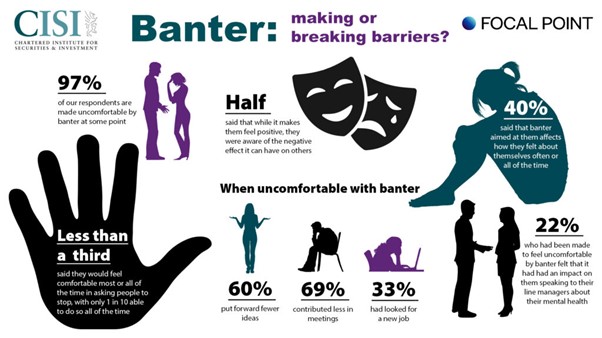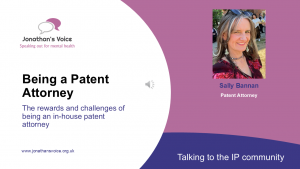The blog below first appeared on the IP Inclusive website. Jonathan’s Voice is grateful to IP Inclusive and to Focal Point Training for allowing it to be reproduced here.
IP Inclusive partners Focal Point Training and the Chartered Institute for Securities & Investment (CISI) recently conducted a survey looking at banter within the financial services professions.
Overall, the results were staggering with 97% of those surveyed stating that they had been made to feel uncomfortable with workplace banter at some point. Workplace banter can be positive, especially when it creates a sense of camaraderie amongst a team. However, banter that becomes inappropriate was found to be damaging and had a negative impact on individuals and their behaviour within the workplace.
Keep reading to discover more of the survey findings as well as some additional resources.
THE SURVEY
The survey was conducted by CISI in collaboration with Focal Point Training. CISI is the professional body for securities, investment, wealth and financial planning professionals in the UK. Focal Point Training provides solutions to organisations to help them create more inclusive workplace environments.
The joint survey received 750 responses, with 43% of respondents being female and 55% being men. In short, the feedback from CISI members, those working in the financial services community and other professional services, was staggering and somewhat concerning.
BANTER IN THE WORKPLACE
One of the most startling findings from the survey was that 97% of respondents said they had been made to feel uncomfortable by workplace banter at some point.
Banter can have a positive role within workplaces, especially in creating a bond between team members. However, not all banter is seen as positive and instead “crosses a line”. Respondents gave examples of when banter crossed the line for them. This included remarks that were rude but said as if they were friendly, jokes about an individual’s weight, negative comments about learning difficulties, sexual discrimination, and banter about an individual’s accent.
IMPACTS OF WORKPLACE BANTER
The most worrying aspect of banter is the negative impact it can have on individuals, organisations and the teams that exist within them.
Firstly, banter in the workplace was found to have a negative impact on individuals. 40% of survey respondents felt that banter which is aimed at them affects how they feel about themselves often or all the time. 25% of respondents also said that banter made them feel uncomfortable at least some of the time.
The negative impacts of workplace banter have also impacted individuals’ abilities to speak up about their mental health in the workplace. In particular, 132 survey respondents who had been made to feel uncomfortable by banter felt that it impacted their ability to speak with their line managers about their mental wellbeing.
Banter was also found to impact performance within the workplace. For example, 69% of survey respondents stated that banter in the workplace had meant that they contributed less to meetings, while 60% said that banter meant that they put fewer ideas forward. This suggests that banter in the workplace is potentially hindering creativity and productivity.
However, there was some recognition that banter can have positive impacts. Banter can be seen as a means of creating a sense of camaraderie and loyalty within teams. Half of survey respondents also stated that banter makes them feel positive. Although, they did recognise the negative effect it can have on others.
Stella Chandler, Director of Focal Point Training, summarised when saying that “banter can bring barriers down in teams but as soon as it crosses the line, barriers go up. This can have a damaging and long-lasting effect on teams and individuals.”
CALLING OUT BANTER
The survey also revealed that some respondents find it difficult to call out banter that is inappropriate or crosses the line. Only 1 in 10 people surveyed felt comfortable to always ask people to stop banter that is inappropriate.
Equally, the survey found that HR departments and the culture within financial services meant that people do not always have confidence to speak up about issues surrounding banter. It was also found that there is a lack of confidence surrounding how HR departments deal with issues related to banter. For example, one respondent mentioned concerns that raising an issue with HR would place their job at risk. Another respondent even went so far as to say they believed that in their organisation, HR made the issue worse when raised.
SO WHAT CAN WE DO?
Samar Yanni, Assistant Director, Head of Membership of CISI, provides some useful tips:
- Managers should be vigilant and adopt a zero-tolerance policy for banter that is inappropriate.
- Banter and the impact it has on mental wellbeing should be discussed during team meetings.
- A sense of trust needs to be created within organisations. This will enable those who raise concerns to know that management will deal with their concerns appropriately and provide the necessary support.
FOCAL POINT TRAINING CAN ALSO HELP…
These tips are great, but people are often still left wondering “How do I do that?” or “How do I create a zero-tolerance policy, where are the lines, have I got it right?” That’s the bit that Focal Point, armed with the results of this latest research, will be able to help with. Their team provides solutions to help organisations create more inclusive workplace environments. For practical guidance on how managers and teams can agree clear boundaries and support managers who need to step in to address inappropriate banter, you can contact them for a confidential discussion.
SOURCES AND FURTHER INFORMATION
- Focal Point Training website – https://www.focalpointtraining.com/
- CISI press release – https://www.cisi.org/cisiweb2/cisi-website/about-us/press-release/2022/08/10/banter-negatively-impacting-97-of-financial-services-professionals-while-hr-departments-have-an-image-problem-says-cisi-survey
- Article in the Financial Times on the CISI and Focal Point survey https://www.ftadviser.com/your-industry/2022/08/11/cisi-warns-managers-of-workplace-banter/
If you’d like to know more about the survey results, and/or about ways to address the impact of banter in your organisation, please contact Focal Point at info@focalpointtraining.com.









